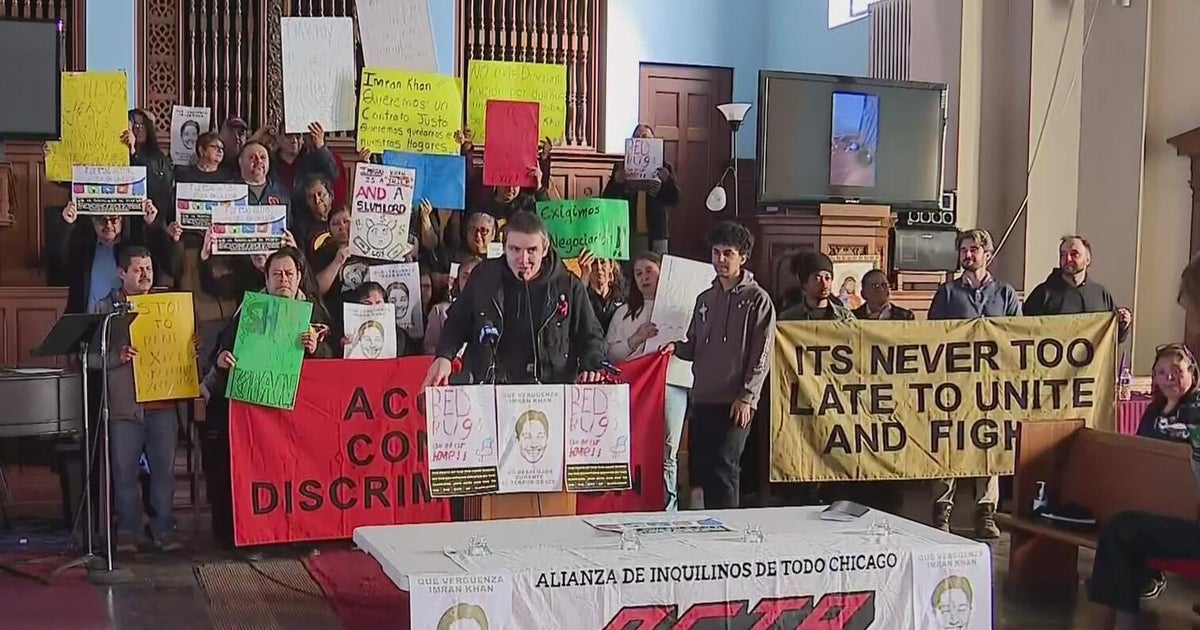WBBM Radiothon: The Many Ways The Salvation Army Makes A Difference
UPDATED 12/16/11 1:20 p.m.
CHICAGO (CBS) -- WBBM Newsradio's annual Good Neighbor Radiothon is underway, this year benefiting the Salvation Army.
Here is a look at the numerous ways in which the Salvation Army makes a difference to those in need in Chicago, from the WBBM Newsradio team.
• Substance Abuse Rehab
• Fighting The Sexual Exploitation Of Children
• Mobile Help For The Homeless
• Help For The Newly Homeless
• Listening, Even When They Can't Help
• Teaching Music
• A New Community Center
TO MAKE A DONATION, CALL (888) 773-2001.
Substance Abuse Rehab
The Salvation Army provides services for many of society's most downtrodden, including those addicted to drugs and alcohol.
As Regine Schlesinger reports, at Harbor Lights Chicago on the city's Near West Side, Salvation Army Capt. Nancy Powers says the Army gives addicts the tools to reclaim their lives once they have hit bottom.
LISTEN: WBBM Newsradio's Regine Schlesinger reports
Podcast
"The same person who just didn't want to even give you eye contact suddenly starts to believe in himself, and believe that at least there might be a future, and they start to have hope," she said.
Day by day, Powers says, the counselors at Harbor Lights turn that hope into real change.
"Not overnight, but little by little, you'll see that they're looking for a job; that they've got a job; that they've talked to a relative – a mother or a sister – that they haven't talked to in sometimes 20, 25 years," Powers says.
Powers says through the Salvation Army substance abuse programs, she sees miracles every day.
Fighting The Sexual Exploitation Of Children
The Salvation Army's PROMISE Program works to turn around the lives of girls who many times are runaways or throwaways, and turn to a pimp for affection.
As Bernie Tafoya reports, often, that means being beaten and forced to sell their bodies.
LISTEN: WBBM Newsradio's Bernie Tafoya reports
Podcast
Turning around that hard-shell exterior is a big job, according PROMISE Program director Frank Massolini.
"They have to have Ph.D.'s in manipulation to survive, and you're talking about kids 12 to 15 years of age here," he said.
Massolini says it has been estimated that on any given day in the Chicago area, at least 8,000 children are being forced to have sex for money or something else of value.
PROMISE is an acronym for "Partnership to Rescue Our Minors from Sexual Exploitation." It focuses on four main goals – awareness, prevention, intervention, and service delivery.
Mobile Help For The Homeless
Every day, the Salvation Army provides shelter and services for the homeless at its many facilities, but they also go out into the community to help those who need it.
As Lisa Fielding reports, on any given night, two mobile units are out and about in Chicago helping the homeless.
LISTEN: WBBM Newsradio's Lisa Fielding reports
Podcast
"We take to the streets that people usually come into agencies to get," said Mobile Outreach and Mobile Feeding Unit spokeswoman Christine Henry.
Henry says the Mobile Feeding Program delivers hot meals at 26 locations on the city's South and West sides, and the North Side's Uptown neighborhood.
Meanwhile, the Mobile Outreach Unit offers counseling and other services. It is staffed by mental health and drug and alcohol rehab specialists, and can offer assistance to anyone who wants to escape life on the street.
Henry says funding is always an issue.
"Because if we had more funding, then we could get more trucks out, and more workers out, and more case managers, and we could get more people," she said.
Last year, the Salvation Army delivered more than 1.5 million nutritious meals in all of its feeding programs combined.
Help For The Newly Homeless
The Salvation Army also offers its services to those who have recently become homeless.
As Mike Krauser reports, the Evangeline Booth Lodge, at 800 W. Lawrence Ave. in Uptown, is a shelter for those who suddenly find themselves homeless.
LISTEN: WBBM Newsradio's Mike Krauser reports
Podcast
"Primarily people who have just been in usually a dramatic situation, like say their landlord went into foreclosure and they were evicted, or they have a job and they just can't make ends meet; they can't make a livable wage," said lodge director Teresa Cortas.
Residents of the shelter work with counselors, Cortas said, to get back on their feet.
"As of today, we have 196 people living here, but 134 of those are children," Cortas said.
Many people at the shelter have never been in such a situation, Cortas said, adding that the majority of residents are not there because of substance abuse or domestic violence.
Listening, Even When They Can't Help
The Salvation Army helps when it can, and just extends a hand when it cannot, and both count.
As John Cody reports, Stacy Allen trained as a nurse, but acts as a social worker at the Salvation Army outpost at 20 S. Campbell Ave. just west of the United Center.
LISTEN: WBBM Newsradio's John Cody reports
Podcast
"(We're) assisting clients with rent, light, gas or mortgage payments. We're handling the food pantry; the distribution of toys for Christmas. A lot of times, you might not be able to help that person, but a lot of times, people feel just that you listened to them; that you took the time out with them," she said. "That makes a big difference."
Teaching Music
The brass and bells of the Salvation Army band fill the streets of Chicago with music regardless of the snow and cold.
As John Cody again reports, Salvation Army musician Lemard Fields has been performing in the cold weather next to a kettle.
LISTEN: WBBM Newsradio's John Cody reports
Podcast
"In a whole lot of frost, just keep the instrument oiled, and keep the valves oiled so that they always move," he said.
Fields acknowledges his euphonium mouthpiece gets chilly in the winter.
"You know, when you put your lips on something that's really cold, you might not want to play anymore. It's an uncomfortable feeling," he said. "If you keep playing constantly to keep the mouthpiece warm, that will be cool."
Fields says the Salvation Army taught him music when he couldn't afford an instrument, and now he's doing the same for kids in Chicago.
A New Community Center
Despite the effects of the Great Recession, one of the Salvation Army's most impressive projects is under construction, and nearing completion.
As WBBM Newsradio's Bob Roberts reports, it will be a community center for the entire South Side and near south suburbs.
LISTEN: WBBM Newsradio's Bob Roberts reports
Podcast
In the entire city of Chicago, there is nothing like the $160 million community center at 119th and Loomis streets in the Morgan Park neighborhood.
Visitors will be able to take computer classes, get financial planning tips, learn to cook, act in community theatre, or learn audio and video production.
They can also play sports in a baseball park underwritten by the White Sox, a basketball court underwritten by the Bulls, or a 5,000-seat football stadium. Or they can play tennis, run track, or practice golfing skills at a driving range and putting greens.
"We're not just about putting the ball in the child's hand and letting him shoot baskets," said Maj. David Harvey, the administrator for the new community center. "We're about their character."
If college is not in a student's direction, Harvey says the community center will provide training in the trades.
"One of the rooms we're having here is an industrial arts room, which a lot of the schools have gotten rid of – with saws, all of the equipment to take care of your home," Harvey said.
Harvey says the main focus of the community center will be grade school children.
"If we can help train them in sports; if we can help develop their character, they're going to be better high school students. They're going to be better college students," he said.
Despite a $110 million grant from the estate of Joan Krok and a fundraising drive, the Salvation Army still needs $13 million to complete construction.
The center is set to open next spring.







